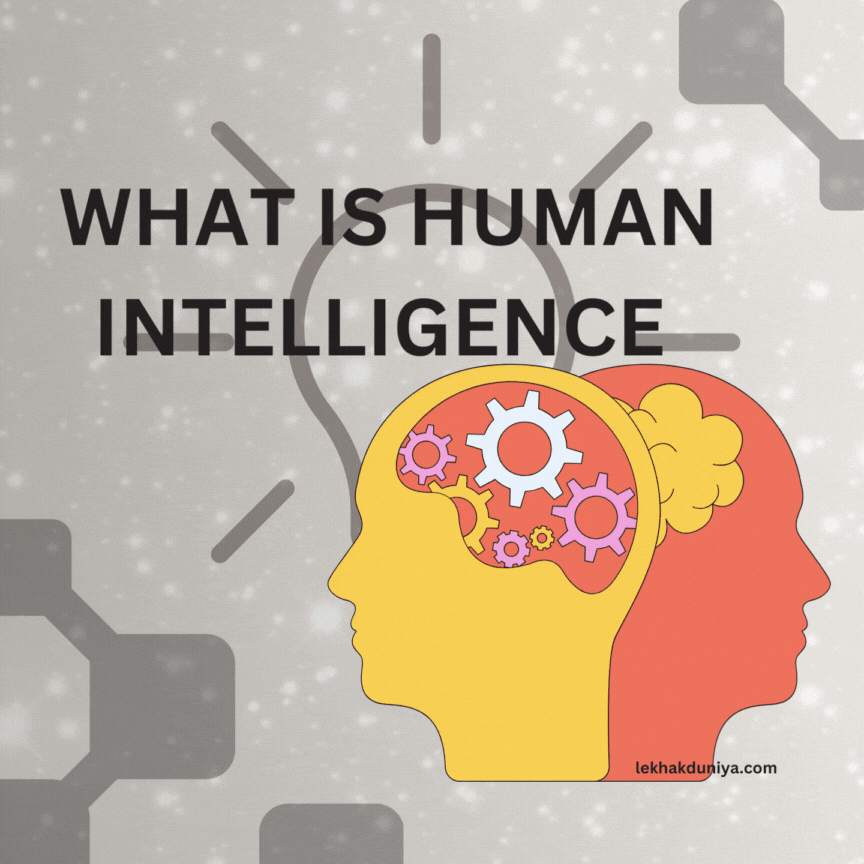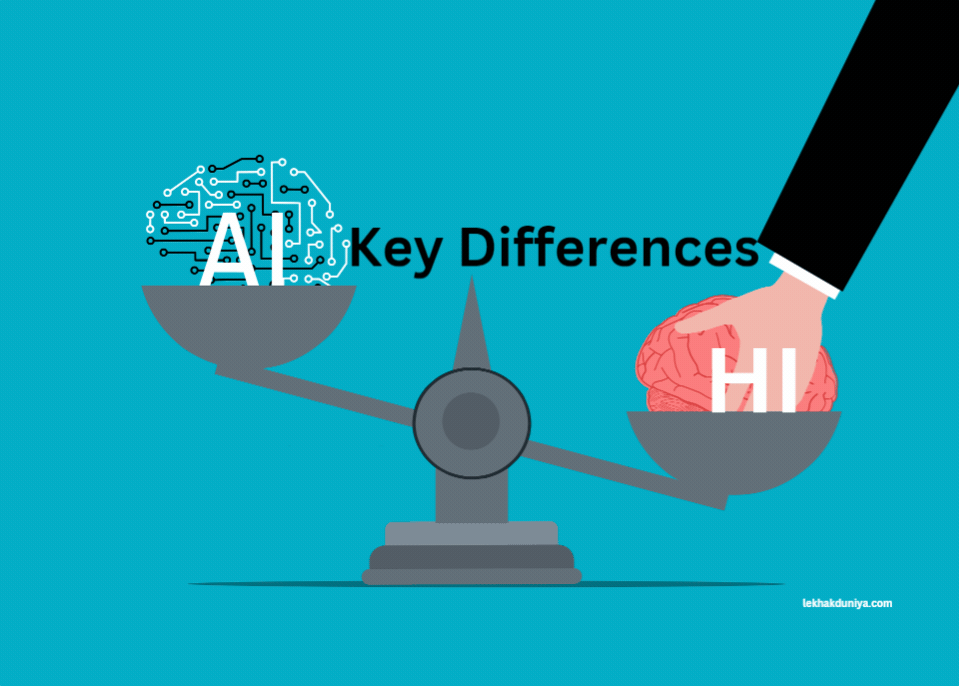The debate over AI vs Human Intelligence is more relevant than ever in today’s fast-evolving digital landscape. AI is quickly becoming part of our daily lives—from virtual assistants and self-driving cars to personalized recommendations and advanced medical technology. But how exactly does artificial intelligence compare to the vast capabilities of the human brain? By uncovering the major differences and intriguing similarities between AI vs. human intelligence, we gain a deeper understanding of how technology will evolve and the role humans will continue to play in a world increasingly influenced by AI.
In this post, we will explore AI vs Human Intelligence, highlighting key differences, similarities, and their real-world applications, as well as what the future may hold for this evolving relationship.
What is Human Intelligence?

Human intelligence is a multi-dimensional and complex ability honed over thousands of years. It allows us to think critically, solve problems, reason, and adapt to new environments. In the comparison between AI and Human Intelligence, several unique aspects of human intelligence come to light:
- Emotional Intelligence: One critical element that sets human intelligence apart in the AI vs Human Intelligence debate is emotional intelligence (EQ). Humans can understand, manage, and respond to their emotions and those of others. This emotional depth is an essential factor in human relationships and decision-making, and it remains an area where AI significantly lags.
- Adaptability: Humans are incredibly adaptable. We learn not just from structured data but also from experiences, emotions, and instincts. In the context of AI vs Human Intelligence, this adaptability gives humans an edge, especially in unfamiliar or unpredictable situations.
- Cognitive Abilities: Human intelligence encompasses advanced cognitive skills such as memory, attention, and abstract thinking. We have the unique ability to combine logic with creativity to solve complex problems—an ability that remains a key differentiator in the AI vs Human Intelligence comparison.
What is Artificial Intelligence?

Artificial Intelligence (AI) refers to the ability of machines, especially computers, to perform tasks that typically require human intelligence. When exploring AI vs Human Intelligence, it’s important to understand the different types of AI:
- Narrow AI: This form of AI, also called weak AI, is designed to perform specific tasks, such as voice recognition or language translation. Narrow AI is highly efficient in particular areas but lacks the flexibility and general cognitive abilities of human intelligence.
- General AI: This hypothetical form of AI would be able to perform any intellectual task that a human can do. While it has yet to be realized, General AI is often central to discussions about the future of AI vs Human Intelligence.
- Superintelligence: A theoretical concept in which AI surpasses human intelligence in all areas, including creativity, social skills, and problem-solving. Although this remains speculative, superintelligence fuels debates about the potential dangers and benefits of AI in the context of AI vs Human Intelligence.
AI systems excel at tasks that involve processing vast amounts of data quickly and efficiently. However, as we’ll explore further, the limitations of AI—especially in areas like emotional understanding and creativity—are significant in the ongoing comparison of AI vs Human Intelligence.
Key Differences Between AI and Human Intelligence

1. Learning Abilities: Data-Driven vs Experiential
One of the most significant differences in the AI vs Human Intelligence discussion is how learning occurs. AI systems rely on data-driven learning, analyzing large datasets to recognize patterns and make predictions. For instance, AI can be trained to recognize objects, predict customer behavior, or even detect diseases.
In contrast, humans learn from experiences, emotions, and intuition. Our ability to adapt and learn from real-world situations—without needing vast amounts of structured data—is one of the key advantages in the AI vs Human Intelligence debate. Humans are also capable of learning from very limited information, something AI struggles with.
2. Problem-Solving Approaches: Algorithmic vs Intuitive
AI approaches problem-solving through algorithms—predefined rules that guide it to specific outcomes. This makes AI incredibly efficient in areas like data analysis, where it can process and interpret information at speeds far beyond human capacity.
Humans, however, solve problems using a combination of logic, intuition, and creativity. We can think outside the box, adapt to unexpected situations, and come up with innovative solutions. In the ongoing AI vs Human Intelligence debate, this intuitive and creative problem-solving ability gives humans a distinctive advantage.
3. Creativity and Innovation: Human Originality vs AI-Generated Content
Creativity is a field where AI vs Human Intelligence presents stark differences. While AI can generate music, art, and even articles by identifying patterns in pre-existing data, these creations are derivative. AI-generated content lacks true originality and emotional depth.
Humans, on the other hand, possess the ability to create entirely new ideas, art forms, and innovations. This creative potential, driven by emotions, experiences, and imagination, sets human intelligence apart in the AI vs Human Intelligence comparison.
4. Emotional Intelligence: Human Empathy vs AI’s Lack of Emotions
A significant distinction in AI vs Human Intelligence is emotional intelligence. While AI can simulate conversations or recognize facial expressions, it doesn’t experience emotions. AI lacks the capacity for empathy, compassion, or emotional understanding—qualities that are essential in fields like healthcare, education, and leadership.
Humans possess emotional intelligence, enabling us to understand and respond to the emotions of others. This ability is crucial for building relationships, resolving conflicts, and making decisions based on both logic and emotion.
Key Similarities Between AI and Human Intelligence

1. Ability to Learn and Improve
Both AI and human intelligence can learn and improve over time. AI systems use machine learning algorithms to become more accurate and efficient, while humans learn through experiences and observations. The shared ability to evolve and adapt is a key similarity in AI vs Human Intelligence.
2. Decision-Making Capabilities
In both AI vs Human Intelligence, decision-making is a central function. AI uses data-driven algorithms to make precise decisions, often in areas like financial modeling or medical diagnoses. Humans also make decisions by analyzing information, but we incorporate emotions, intuition, and ethical considerations into the process, making our decision-making more complex and multifaceted.
3. Pattern Recognition
Both AI and human intelligence excel at pattern recognition, though in different ways. AI can process vast datasets to identify trends and correlations, making it invaluable in areas like predictive analytics and fraud detection. Humans, meanwhile, use intuition and experience to recognize patterns in social behavior, language, and problem-solving, adding flexibility to our responses.
Real-World Applications

The AI vs Human Intelligence debate is most clearly seen in real-world applications where both AI and human intelligence are leveraged together:
- Healthcare: AI assists doctors by analyzing patient records and medical images to make diagnoses. However, the human touch remains essential for patient care, as empathy, ethical decision-making, and emotional intelligence play a crucial role.
- Education: AI-driven learning platforms tailor lessons to students’ individual needs, but teachers provide emotional support, motivation, and personalized instruction that AI cannot replicate.
- Business: AI can optimize processes, predict trends, and automate tasks, but human creativity, strategic thinking, and leadership remain crucial for innovation and long-term growth.
The Future of AI and Human Intelligence

As AI technology advances, the relationship between AI and Human Intelligence will evolve. The future may see AI improving its emotional intelligence and creative capabilities, but for now, the human touch remains irreplaceable. The key will be fostering collaboration between AI and human intelligence, with each enhancing the other’s strengths.
Ethical issues like job displacement and data privacy will continue to influence how we integrate AI into society. Ensuring that AI complements human abilities—rather than replacing them—will be crucial for a balanced future.
The comparison between AI and Human Intelligence highlights both unique strengths and shared capabilities. While AI excels at processing large datasets and performing specific tasks, human intelligence remains unparalleled in areas like emotional understanding, creativity, and adaptability. In the future, a partnership between AI and humans will likely offer the best of both worlds.
Understanding these key differences and similarities in AI vs Human Intelligence will help us navigate the future of technology, ensuring that AI enhances, rather than replaces, the value of human ingenuity.




Pink Withney I do not even understand how I ended up here, but I assumed this publish used to be great
Insanont Very well presented. Every quote was awesome and thanks for sharing the content. Keep sharing and keep motivating others.